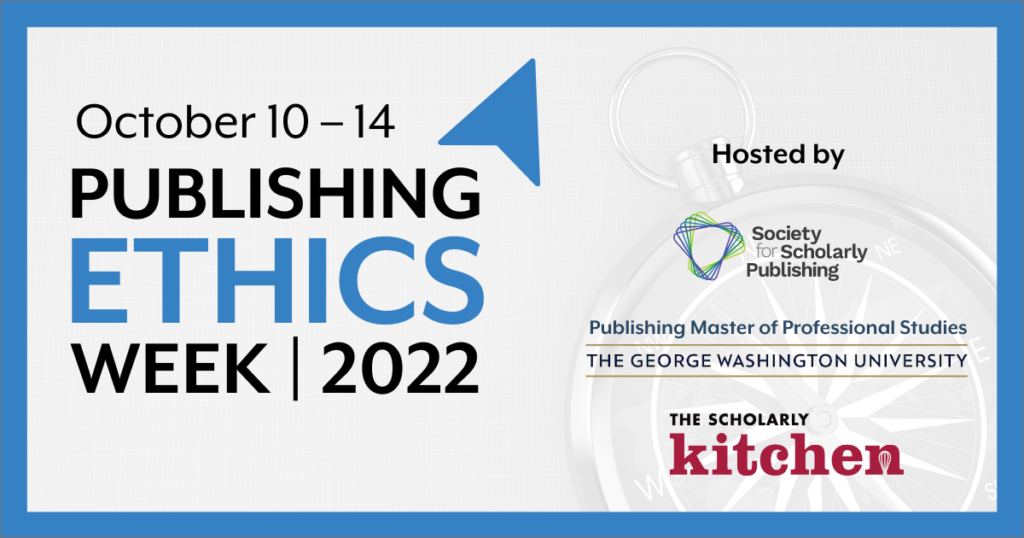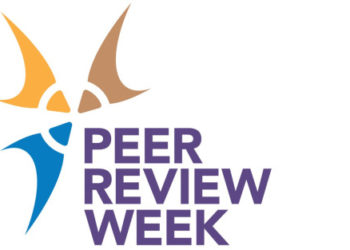Editor’s Note: This week marks the first ever unofficial “Publishing Ethics Week”. #PublishingEthicsWeek22 launches with a special collection of resources from a host of scholarly publishing organizations, including the Journal of Ethics in Publishing, AUPresses, Paths in Publishing, the European Association of Science Editors, Learned Publishing, and more. Join SSP on October 12 for “Three Ethical Challenges in Scholarly Communication,” featuring an international panel that will discuss citation leakage, text recycling, and ethical issues around data publishing. Closing out the week will be the 12th Annual GW Ethics in Publishing Conference whose theme is “Ethics in Action.” Held in a hybrid format on October 14, registration is free of charge, both in-person and virtual! Scholarly communications and publishing organizations across the industry are invited to collaborate on raising awareness of publishing ethics by contributing content, programming, or resources that highlight issues of publishing ethics. We welcome collaborators of all kinds! Submit your resource or email Jacklyn Lord, SSP’s Marketing and Operations Manager, for more information.
Today’s post is by Allegra Martschenko and Rachael Levay who will be discussing mentorship with Brian Halley at the 2022 GW Ethics in Publishing Conference this Friday October 14 at 2:15 pm ET. Allegra is a Paths in Publishing (PIP) cofounder and an acquisitions editor at the University Press of Colorado. They started in publishing as a Sales intern at Princeton University Press and spent a year at Cornell University Press as a 2020-2021 Mellon Diversity Fellow. Rachael is a PIP cofounder, Editor-in-Chief at the University Press of Colorado, and acquires for the Utah State University Press imprint. She was the Marketing and Sales Director at the University of Washington Press and has experience mentoring several generations of incredible university press staff.
As scholarly publishing develops its investment in diversity, equity, inclusion, and justice (DEIJ), a major challenge is an ongoing and persistent need to retain staff beyond entry-level positions. As part of Ethics Week, we wanted to discuss mentorship in publishing, which serves as a crucial method of retention and advancement at all levels.
Ethical publishing requires the ethical treatment of its employees, but a number of publishing careers stagnate when responsibilities grow while pay flatlines and positions open infrequently – or when work environments fail to offer room or opportunities to grow. Mentorship can be a way out and through, but for many early-career folks in scholarly publishing, finding and developing a relationship with a mentor can be a challenge – and if one’s mentor is their supervisor, it can be even harder to get support when considering a job move.
There’s a need to provide responsible, ethical mentorship. For our purposes, we define ethical mentorship as a method of information sharing that prioritizes growth, communication, and career progression and that neither harms nor overburdens those offering information or those receiving it. This type of mentorship, especially for early-career professionals, is invaluable. Too often those beginning their careers need to build critical skills to advance — the sorts of skills that typically require you to do the job above you, without the pay. This system is unsustainable and unfair, and mentorship will need to rethink ways of imparting skills without relying too heavily on unpaid labor — from either mentors or mentees.

Programs like Paths in Publishing aim to offer mentorship to those without preexisting networks, or whose networks are limited by geography or job position, and make resources publicly available. Its varied programming offers different types of support, both to accommodate those with different learning styles, needs, and preferences, and to remove the burden of mentorship from any single (or handful) of people.
Being able to take advantage of the various types of mentorship possible is a crucial skill for early career professionals, especially those who are BIPOC/LGTBQ/disabled, and who face challenging, unequal, and sometimes discriminatory obstacles in their career advancement. One-on-one traditional mentorship can be unfulfilling, fail to provide proactive support, and pose a challenge for each party. Below, we adopt Amy Sherman’s framework for mentorship categorization to better establish our definition of ethical mentorship not just as a transactional relationship, but as a set of methods for information transmission. Understanding what kind of mentorship suits you for different needs is a means of radically rethinking how and what kinds of people access networks.
Types of Mentorship Relationships
One-on-one/traditional
This form of mentorship is what people most often think of when they think of “mentors.” A one-on-one long term relationship forms in which a mentor imparts knowledge to a mentee. It can be difficult to set up a relationship like this without preexisting access to industry professionals and publishing arguably relies on it too much for the advancement of early career professionals and for job training. These mentors provide recommendations, review your application materials, guide your career, and potentially offer you a chance to build additional skills. Most typically, they have more experience than you.
Unfortunately, as Lee and Low’s Diversity Baseline Surveys show, publishing is majority white, especially in university presses, and later career mentors may not be well positioned to aid in the unique challenges that marginalized, early-career professionals face, if they can even manage to set up the relationship. This puts a diverse workforce at a disadvantage when it comes to this sort of relationship.
Furthermore, this often requires the most work on the mentor side to function, and this burden usually falls on those already burned out by the industry. While one-on-one mentorship is an invaluable long term tool, it is not the only option in the industry and, even when there is a one-on-one mentorship relationship, reciprocal relationships should still be prioritized. Mentors are learning from mentees as much as it is the other way around, and attempting to flatten that hierarchy a bit can be beneficial to both parties.
Spot
This form of mentorship is short term. A mentor might offer to review your materials once, do a single informational interview, or answer specific questions. These are one-off relationships very similar in scope to Paths in Publishing’s Open Inbox program. This removes any undue burden from the mentor and allows a mentee to reach out as necessary to a wide range of people for information. For a mentor, being willing to offer informational interviews to curious candidates can be an invaluable method of career advancement and service. For a mentee, being willing to request informational interviews or ask for support in reviewing their application materials, can be a critical tool for figuring out one’s individual path in the industry as well as in building a broad network.
Diffuse
This form of mentorship is widespread and generalized—for instance, using social media to share tips and guidance. Paths in Publishing’s website, Twitter, and newsletter offer tips and tricks to a broad and anonymous audience. Professionals can self select in and out, and have stable resources to refer back to when needed. Transparency is a critical tool of DEIJ work, and diffuse mentorship aims to make the industry more transparent and thus more navigable through wider spread knowledge.
Peer
This form of mentorship draws on the colleagues at your same or very similar levels. Being able to establish relationships with people who are going through the same struggles and triumphs as you will allow you to build community. Reaching out to other assistants can help you to learn about the processes at other presses, make friends to battle burnout with, and offer a group to celebrate your victories. This form is not to be overlooked during any phase of your career: your peers are all a wealth of information, and when you make friends, their networks become yours as well. Programs such as Paths in Publishing’s PAGES Book Club aim to provide spaces for people to connect on a peer-to-peer level and advance the industry forward together.
Other Routes
While we’ve used Paths in Publishing as an example of the ways we need to expand our conceptions of mentorship in order to cultivate and retain a more diverse workforce, there are a number of other programs, organizations, and resources that can and should be drawn on. Our role as individuals and, at a higher level, as publishing organizations should be to foster mentorship programs internally and externally, and make room for professionals to prioritize this work as part of their day-to-day jobs. Too often individuals talk about the difficulty of “carving out time” for work that should be sustaining, creative, and fulfilling – work like embracing mentorship and enacting DEIJ efforts. Both individuals and institutions can prioritize mentorship by weaving it into work time and ongoing organizational priorities to support those who take on this additional labor. Only by a reconceiving of this work as integral to our jobs and our larger industry will publishing be able to foster an ethical community, and truly bring early career professionals and their valuable experiences and ideas to the table.



